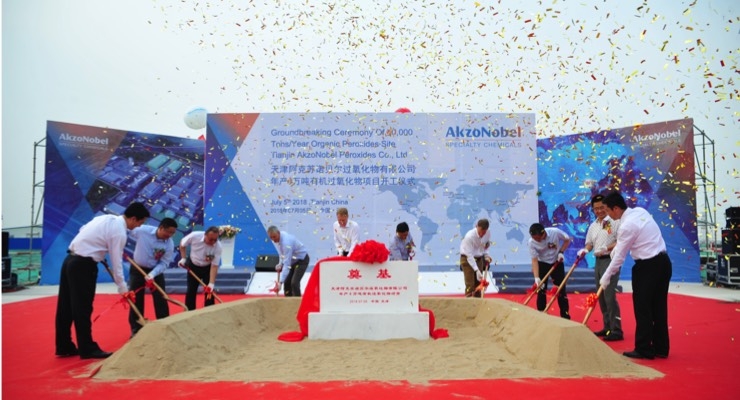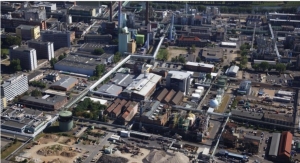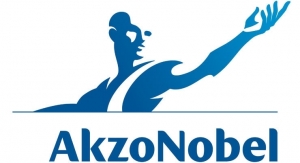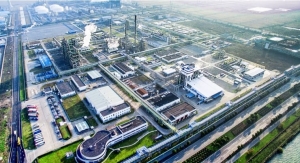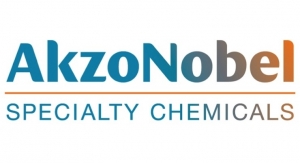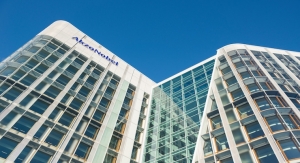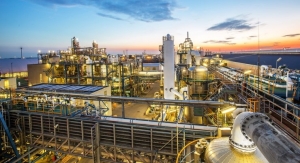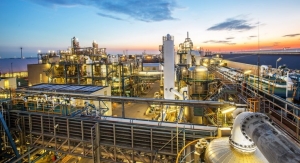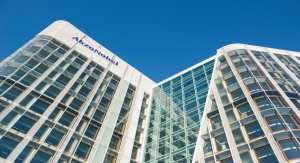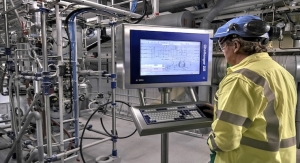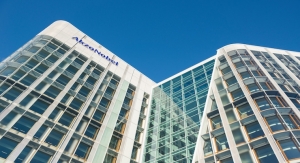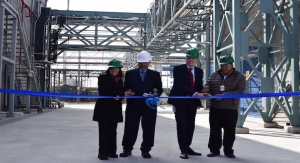07.06.18
AkzoNobel Specialty Chemicals officially broke ground for construction of a state-of-the-art organic peroxide production facility in Tianjin, China. Organic peroxides are essential in the manufacture of a wide range of polymers including PVC and thermoset resins.
The €90-million facility, located in the Tianjin Nangang Industrial Zone, will replace the company's existing organic peroxides plant in Tianjin, and supports efforts being made by Chinese authorities to optimize urban planning and produce an industrial upgrade in the country's chemical industry.
Scheduled for completion in the second quarter of 2020, it will also provide capacity expansions of between 30 and 70 percent depending on product line, allowing the company to support the growth of its customers.
"Demand for organic peroxide continues to increase in Asia and around the world," said Jack Li, regional sales director, Polymer Chemistry.
Li says end use markets for organic peroxides are growing annually between five and six percent in China, outpacing growth in the rest of the world.
Johan Landfors, executive committee member responsible for Polymer Chemistry, said the company is focusing on improving sustainability at the new site to meet the Chinese government's stringent requirements.
"We are installing an innovative technology to minimize discharge of waste water. New equipment will also streamline our production processes, helping us to reduce our water and energy consumption while removing volatile organic compounds," he added.
Said AkzoNobel Specialty Chemicals CEO Werner Fuhrmann: "We have partnered closely with the Tianjin Economic - Technological Development Area to construct a site that not ony meets the needs of the city, but also those of our business, customers and employees. Our company is committed to China and has received strong support from its government agencies to ensure success on this project."
AkzoNobel Specialty Chemicals has invested more than €180 million over the last three years to better serve its customers in the polymer industry, upgrading technologies, increasing capacity, and repositioning its global manufacturing footprint at sites in Mexico, the Netherlands, Belgium, China, Italy, Brazil and the U.S.
The €90-million facility, located in the Tianjin Nangang Industrial Zone, will replace the company's existing organic peroxides plant in Tianjin, and supports efforts being made by Chinese authorities to optimize urban planning and produce an industrial upgrade in the country's chemical industry.
Scheduled for completion in the second quarter of 2020, it will also provide capacity expansions of between 30 and 70 percent depending on product line, allowing the company to support the growth of its customers.
"Demand for organic peroxide continues to increase in Asia and around the world," said Jack Li, regional sales director, Polymer Chemistry.
Li says end use markets for organic peroxides are growing annually between five and six percent in China, outpacing growth in the rest of the world.
Johan Landfors, executive committee member responsible for Polymer Chemistry, said the company is focusing on improving sustainability at the new site to meet the Chinese government's stringent requirements.
"We are installing an innovative technology to minimize discharge of waste water. New equipment will also streamline our production processes, helping us to reduce our water and energy consumption while removing volatile organic compounds," he added.
Said AkzoNobel Specialty Chemicals CEO Werner Fuhrmann: "We have partnered closely with the Tianjin Economic - Technological Development Area to construct a site that not ony meets the needs of the city, but also those of our business, customers and employees. Our company is committed to China and has received strong support from its government agencies to ensure success on this project."
AkzoNobel Specialty Chemicals has invested more than €180 million over the last three years to better serve its customers in the polymer industry, upgrading technologies, increasing capacity, and repositioning its global manufacturing footprint at sites in Mexico, the Netherlands, Belgium, China, Italy, Brazil and the U.S.

